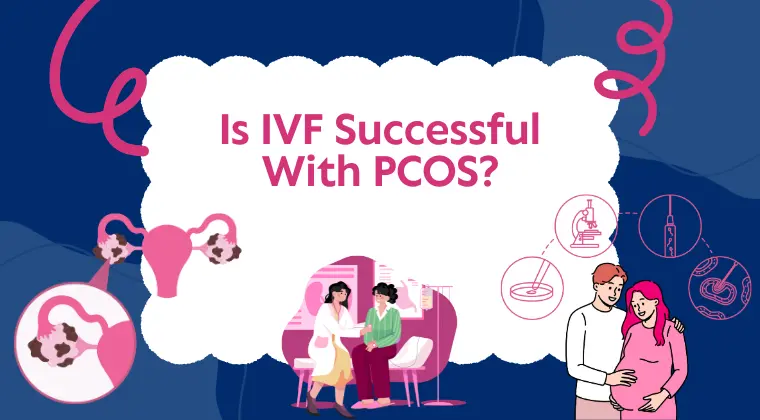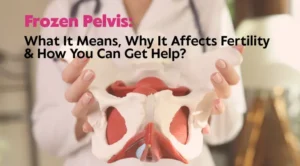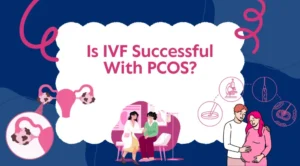Suppose you’ve recently been diagnosed with PCOS (Polycystic Ovary Syndrome) and are thinking about IVF (In Vitro Fertilization) to help you have a baby. In that case, you might feel overwhelmed, confused, or even worried.
It’s normal to have many questions. Will IVF work for me? How is it different for someone with PCOS? Will I need extra treatments? Will it be harder for me?
Let’s break it down and answer these questions in a way that makes everything clear and easy to understand.
What is PCOS, and How Does it Affect Getting Pregnant?
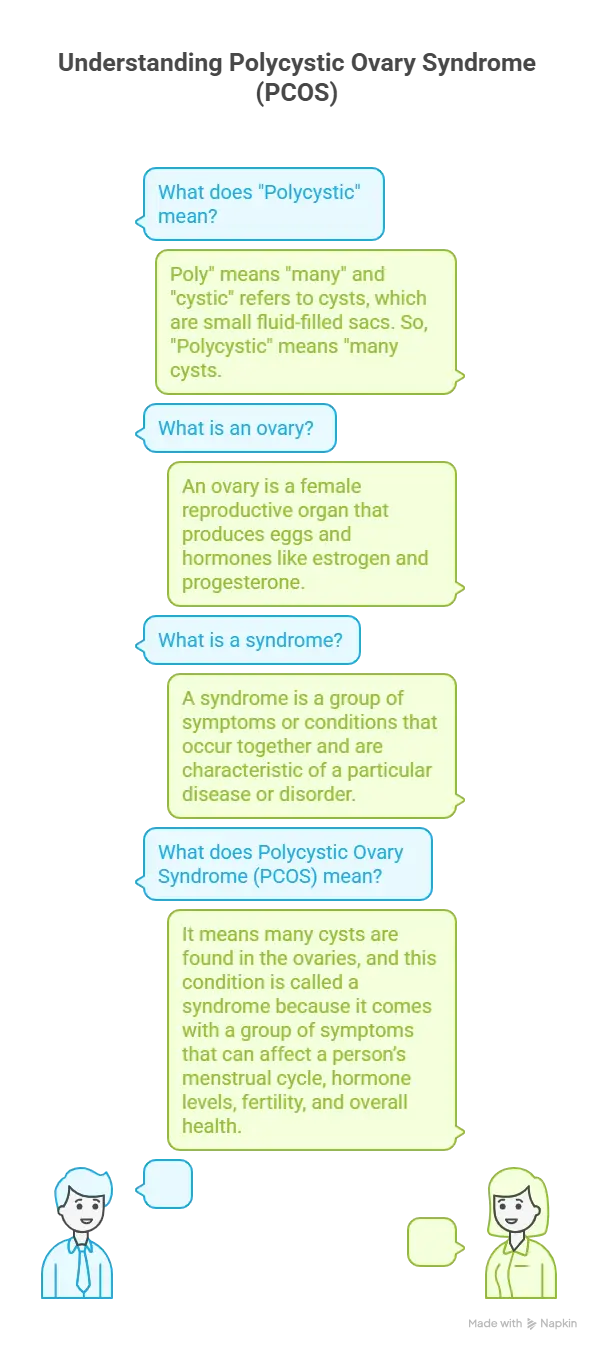
First, let’s understand PCOS. Polycystic Ovary Syndrome is a condition where the ovaries (the organs that make eggs) don’t work the way they should. Normally, one egg is prepared to leave the ovaries each month, but with PCOS, too many eggs may grow, but they don’t get released properly. Instead, they stay stuck in the ovaries as small cysts.
This can make it hard to get pregnant because the eggs aren’t mature or ready to be fertilized. It’s like trying to bake a cake with ingredients that aren’t mixed properly – it’s not going to turn out right.
Ovaries play a great role in pregnancy.
Imagine your ovaries are like two little factories inside your body, and these factories are in charge of making eggs. Every month, one of these eggs is released from your ovaries. This is called ovulation.
Here’s how the process works:
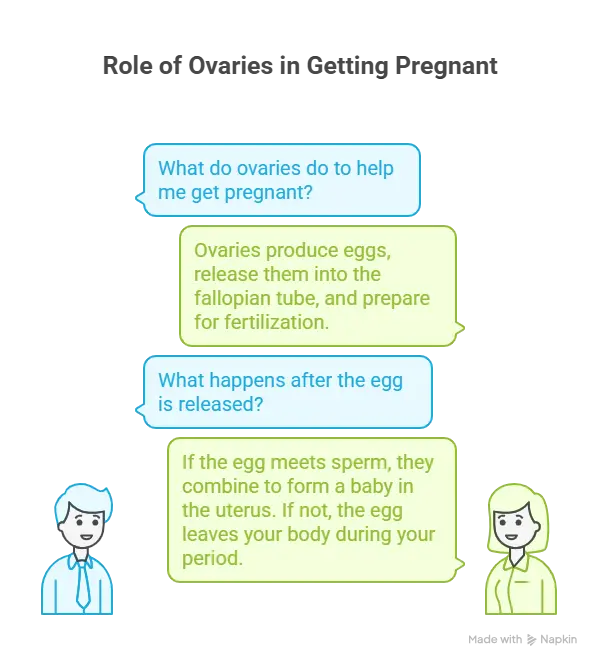
So, the ovaries are the key players in making sure you can have a baby. They produce and release the eggs, and the eggs need to meet sperm at the right time for pregnancy to happen!
Now that you understand the role of the ovaries and what PCOS is, let’s explore what IVF is.
What is IVF?
Let’s break down the words in In Vitro Fertilization (IVF) to understand their meaning:
In Vitro
- “In” means inside.
- “Vitro” comes from the Latin word for glass.
So, “In Vitro” means “in glass”. It refers to the process that occurs outside the body, typically in a laboratory dish or test tube. Think of it like mixing ingredients in a bowl, rather than in your kitchen.
Fertilization
- “Fertilization” is when a sperm (from a man) meets an egg (from a woman) and joins together to form a baby.
It’s like planting a seed in the ground to start growing a plant. In IVF, fertilisation occurs in a laboratory, not inside the body.
So, "In Vitro Fertilization" means:
The process where eggs and sperm are combined in a glass dish (outside the body) in a lab to create a fertilized egg, which can then be placed inside the woman’s uterus to grow into a baby.
It’s a fancy way of saying “helping create a baby outside the body”!
In PCOS, the eggs produced are of low quality, and proper fertilisation is not possible. Through IVF and medications, the egg quality can be improved, and pregnancy is possible.
How Does IVF Work for Someone with PCOS?
In IVF, doctors help eggs grow and become ready for fertilization, but with PCOS, things can get a little tricky. Here’s what happens:
- Ovary Stimulation:
To help the ovaries release eggs, doctors give you medication to stimulate the ovaries. Normally, ovaries produce one egg a month, but for IVF, we want multiple eggs that are ready to be fertilized. In PCOS, the ovaries might already be a bit overactive, and they could try to make too many eggs. We carefully adjust your medication to ensure the eggs grow properly without being excessive.
Nice to Know If too many eggs are produced, it can cause Ovarian Hyperstimulation Syndrome (OHSS), leading to swelling, discomfort, and even more serious issues. But with careful monitoring and medication adjustments, doctors aim to avoid this and keep the process safe and smooth for you. |
- Egg Collection:
After your eggs are ready, the doctor will collect them from your ovaries in a small procedure. Think of it like carefully picking the best eggs from a basket. - Fertilization:
The collected eggs are then mixed with sperm (the male component required to produce a baby) in a laboratory. This is called fertilization, and it’s where the magic happens! If the egg and sperm join, they form a tiny baby, known as an embryo. - Embryo Transfer: Once the embryo has grown for a few days, the doctor will place it in your uterus, hoping it will implant and begin growing into a baby.
What are the success rates of IVF with PCOS?
Research shows that women with PCOS have success rates similar to women without it. Let’s break down what the research actually shows:
Overall Success Rates
Recent studies show that women with PCOS have similar IVF success rates to those without it. A big study in 2021 looked at over 21,000 women with PCOS and compared them to over 43,000 women without PCOS. The results showed no big difference in pregnancy and birth rates between the two groups.
Age-Specific Success Rates
Women Under 35
Women 35 and Older
- Fresh embryo transfer: 30.6% chance of having a baby and 38.7% chance of pregnancy per cycle. (source)
- Frozen embryo transfer: 29.0% live birth rate, 34.1% clinical pregnancy rate. (source)
- Women over 40 with PCOS have a 42.3% live birth rate, which is much higher than the 18.5% for women without PCOS. (source)
Cumulative Success Rates (CLBR)
Cumulative success rates examine all IVF cycles (fresh and frozen) from a single round of egg collection. Here’s how PCOS compares to others:
What Does This Mean for You?
The bottom line is that IVF can be very successful for women with PCOS. Even though there may be some challenges (like hormonal imbalances or more eggs being produced), research shows that many women with PCOS have healthy pregnancies and babies through IVF. Your chances are especially good if you’re under 35, with up to 60% success in your first cycle!
If you’re over 35, your chances are still strong, but it might take a few cycles to get the results you want. The key is working closely with your doctor to manage the treatment and give yourself the best chance of success.
Can PCOS patients conceive through IVF?
Yes! The only difference is that our approach is slightly different. If you have PCOS and are considering IVF, there are a few things you’ll need to know:
- More IVF Cycles:
You might need a few more cycles of IVF than someone without PCOS. This is because the ovaries may require additional support to respond effectively to the treatment. But it doesn’t mean IVF won’t work. Many people with PCOS go on to have successful pregnancies after a few cycles. - Cost:
IVF can be expensive, and for people with PCOS, there might be some extra treatments or medications involved to help manage the condition. However, it’s essential to discuss the cost with your doctor upfront, so you know what to expect. - Extra Treatments:
We recommend weight loss, hormonal treatments, or other medications before starting IVF to increase your chances of success. Achieving the best possible body shape can enhance your response to IVF. - Medications:
The medications for PCOS may work a little differently. We adjust the doses to balance your hormones and help your ovaries respond well to the treatment. Be prepared for some adjustments along the way.
Will IVF Be More Difficult for Me if I Have PCOS?
It’s normal to feel a little nervous, especially if you’ve been struggling with PCOS for a while. But remember, PCOS doesn’t make IVF impossible; it just means you might need a little more help. The hormonal injections and medications might have side effects, but we will help you manage them. Many women with PCOS successfully go through IVF and have healthy babies!
What Can You Do to Improve Your Chances?

Final Thoughts
IVF with PCOS can feel a little more complicated, but it can work! Many women with PCOS go on to have successful pregnancies with IVF. With the right treatment plan, care, and support, your chances of becoming a parent are very real. Keep hope and stay positive. You’re not alone on this journey, and with the right help, your dream of having a baby can come true.
If you’re ready to get started or have more questions, talk to a fertility specialist who can guide you through the process and give you the best possible care.

